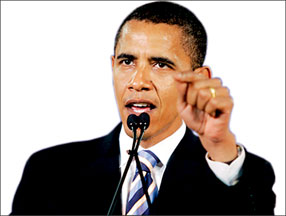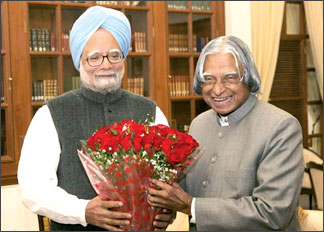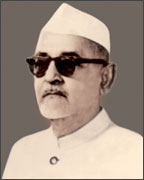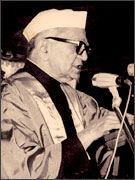Would Obama soften Muslim militancy?
Zoom Lens by Afreeha Jawad
[email protected]
|

Barack Obama- the White House hopeful
|
Electoral stature could not have had it any better as the political
elegance and maturity evidenced in the US election primaries.
Barack Obama - a black Kenyan Muslim convert to Christianity
currently leads the presidential primaries gallop which if among other
things, astronomical powers decide, will position him into the world's
most powerful leader - hopefully not of military might but of moral
right - needless to say what comes off the white citadel is not without
its thunderous impact on the world outside.
All this apart, what baffles one and all is the American populace's
changing mindset from a rigid, restricted, constrained one into a more
effulgent, broad and vibrant entity.
|

Indian Prime Minister Manmohan Singh with India’s third Muslim
president Abdul Kalaam |
The inborn hatred of the blacks, the disregard of them over a long
period of time gradually has unfolded into one of accommodation and
magnanimity so much so, their preference of such hate over their own
white membership into being their destiny bearer.
Reflecting on this change of heart, what's most evident is the
disgust of US foreign policy and the fatigue of seeing dynasty
rule-perhaps twin elements forefronting such change.
The US citizenry in opting for this choice has also filled the space
arising out of an ever widening majority/minority divide - not to forget
the majority whites themselves developing statesmanly characteristics,
proving to the world that people left to themselves are more into
rationality unlike emotion bound politicians that use the
ethno/religious canard for power acquisition.
Seemingly, it is US growth and development that are the American's
prime concern and not the narrow domestic walls of race, caste, colour
and nationality as R. Tagore that famous Indian poet would have it.
The Indian front
On the Indian front, reduced ethno/religious tensions following
minority persons such as Zakir Hussain, Fakhruddin Ali Ahmed, Ramaswamy
Venkataraman Abdul Kalaam and Manmohan Singh into political hot seats
speaks volumes for the de-escalation of an ultra-nationalistic mindset.
 |
 |
Zakir Hussain
-
The first Muslim president of India |
Fakhruddin Ali
Ahmed -
India’s second Muslim president |
After all, of what use are culture and civilization devoid of
national growth and the universal whole? Man in his primordial existence
knew no identity nor any form of labelling. The world in its natural
state ran to perfection while chaos was ignited following man's
interference with such purity.
That the populace in these two countries - both liberal democratic
giants see the futility of war - the attraction being more towards
sharing, tolerance and accommodation which refinement and grandeur only
the Indo/US mind could lay claim to is emulation worthy by the rest.
Positive institutional merge
Though the two sub-continents are vehemently into secularism in
keeping the state/church dichotomy alive, judging from their own
performance one could see such institutional merge of a positive nature.
For instance, transcending social constructs of ethno/religious
identities, these people see humanity's universal whole that augurs well
for national growth and development.
Keeping both state and church apart meant the disregard for sanctity
in matters concerning the state. The merger in its ideal state would
augur well for any country and its people though it hardly happens that
way.
Noteworthy is the fact that in Asian countries, religion has been a
powerful tool into power consolidation - a negative merge of state and
church. Identity politics being widespread in the Asian region,
electioneering does not escape ethnocentric sentiments.
"You don't need to be a believer in God to do the right thing," -
Obama's most profound pronouncement at one of his election deliveries
certainly ground work into leading a people out of the very monotonous,
streamlined narrow thought process of ultra-nationalistic tendencies -
the US people believably already there.
Obviously Obama was hinting at societal hypocrisy in mechanical
worship while into morality violation - be it in political decisions or
individual acts. Ultra-nationalistic views alone are derogatory of any
given religious ideology - both highly incompatible and uncomplimentary
of all religious ideologies.
The Indian and US people's exposure to a rich cultural diversity
along with their enlightened leadership lineage. Eisenhower, Roosevelt,
Abraham Lincoln, Ranmoham Raj, Vidyasagar, Sarojini Naidu and Mahatma
Gandhi have indeed been contributing to their stature - a gradual shift
from the stiff ultra-nationalistic mindset - seemingly a genuine and
very pragmatic move into realistic patriotism.
However, to ride the crest wave of ethno/popularism wouldn't be that
easy all the time - for societal interdiction of such is inevitable
after a time period. This then is basic economics. Finally the people's
decision will prevail as we already see in the Indo/US arena though amid
different circumstances.
Patriotism
Be it Kenyan black Muslim Barack Obama on his way hopefully into the
Oval office or minority Sikh Prime Minister Manmohan Singh, not to
forget former Indian Presidents Zakir Hussain and Abdul Kalaam among
others clearly messages the fact that the people of these two
Sub-continents not only uphold very high pluralistic ideals but also
contribute significantly to a deep sense of patriotism that transcends
the narrow chauvinistic kind - the herd instinct common only to the
world of beasts.
Thus, civil society could lead rulers into the type of world of their
taste. Recent developments in Kosovo says it all.
The US paradigm shift
The Islamic world view on the US as a pro-Christian, anti-Islamic
entity has now taken a turn for the better following its recognition of
Kosovo. Certainly, the US stance off sets whatever has been its policy
in whipping up an anti-American mindset among the global Muslim
populace.
The US paradigm shift could also be viewed in the light of Obama's
Muslim roots should be become the world's most powerful man.
Besides, Bush himself may have known the anguish of isolation against
the backdrop of his own people dismissing narrow boundaries in voting
for Obama.
So before, the US citizenry could in to wipe out ethno/populist views
by backing Obama into the world's hottest seat, Bush may have opted for
more prudent decision in going ahead helping Kosovo into freedom.
Regardless of US motive it is now upto the Muslim militancy to
welcome this accommodative approach by softening whatever rigid outfit. |
